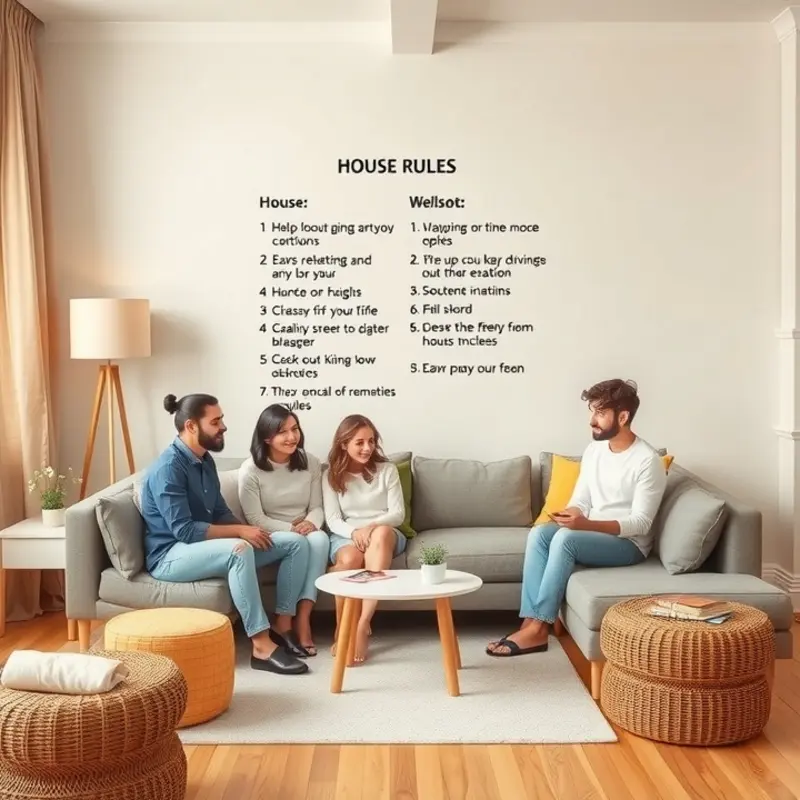Living in an apartment with roommates can be both a delightful and daunting experience. Whether you’re a young renter sharing a space with friends, a couple navigating the nuances of domestic life, or a family building your dreams under one roof, communication can be the secret sauce or the spicy disaster to your living arrangement. “Did you eat my leftovers?” “Who left the lights on again?”—if these phrases sound familiar, then it’s time to revamp your roommate communication strategy. The key is to maintain a balance between making your apartment feel like a cozy home while avoiding the frantic shouting matches that can come from misunderstandings. Dive into our practical tips that blend light-hearted humor with real advice to ensure your cohabitation remains pleasant. After all, who’d want to wage war over dirty dishes or mismatched shower schedules? Let’s untangle the mess of lost socks and unflushed toilets and create a living arrangement that’s harmonious, fun, and just the right amount of quirky!
The Art of Whimsical Communication

Living with roommates can be a delightful adventure, enhanced by imaginative communication techniques that keep the ambiance cheerful and the flow of dialogue smooth. Ensuring everyone stays informed and in harmony might seem a tall order, but a dash of creativity can transform everyday exchanges.
One exciting way to start is by turning a plain whiteboard into a lively message hub in your shared living space. Use color-coded markers for each roommate so everyone’s updates, reminders, and musings stand out. Feel free to doodle, crack a joke, or sketch a quick comic strip that underscores a point. For instance, a quirky cartoon illustrating the perils of leaving dirty dishes in the sink can convey your message without sounding accusatory.
Weekly check-ins could become a ritual of sorts. Instead of mundane meetings, turn them into themed gatherings where everyone shares highlights of their week or thoughts on apartment matters. Draw cards with topics like ‘highlight of the week’ or ‘one thing I learned’ to keep the conversation light and enjoyable. Laughter can significantly ease the stress of planning grocery trips or deciding on shared resources, making decision-making feel less like an obligation and more like an opportunity to bond.
When it comes to setting boundaries, utilizing humor as a softening tool can be incredibly effective. Maybe a sign on the fridge reading “Hands off unless it’s labeled or unloved!” could draw smiles while reinforcing personal space over communal items. If someone encroaches on your shelf space or uses your laundry day, a gentle meme or GIF in your group chat can serve as a reminder without sparking tension.
Joint decisions, such as choosing a new apartment project or color scheme, can be transformed into a game. Use persuasive yet playful pitches followed by anonymous voting. This approach offers everyone equal influence while maintaining a playful dynamic. Try incorporating some crafty elements like creating a Pinterest board together or designing a vision board that reflects everyone’s expressions. Here is an insightful read about maintaining apartment harmony through shared projects: DIY Renter-Safe Coat Hooks.
Discussions on cleaning schedules or bill-sharing can be daunting yet vital. Light-heartedly dividing chores through a chore-wheel app or drawing tasks from a decorated jar could add an element of surprise and reduce drudgery. Remember, it’s essential to approach these dialogues with an open heart and a sense of humor to promote a balanced rapport.
For conflicts that seem tougher than they are, it’s beneficial to frame conversations positively. Use “I feel” statements along with a funny story or anecdote when bringing issues forward. This technique shows sensitivity to others’ feelings and encourages empathy. It’s often easier to engage and resolve disputes in a light-hearted atmosphere rather than through confrontational dialogues.
By infusing humor and creativity into daily interactions, you can cultivate an enjoyable and supportive shared home environment. The aim is to build a communal ethos that thrives on laughter, mutual respect, and collaboration.
Building a Happy Home Through Respectful Boundaries

Creating a harmonious living environment in a shared space hinges on setting boundaries that respect everyone’s needs. This balance not only promotes peace but also fosters personal growth and individuality. Crafting house rules is a vital step. Begin with a discussion where each roommate can voice non-negotiable needs. Writing down these ideas ensures clarity and serves as a reference.
Quiet Hours and Personal Space
Establishing quiet hours helps accommodate different schedules and lifestyles. Decide on a period that accommodates late risers and early birds alike, ensuring no one feels compromised. In small apartments, personal space can feel elusive. Each person should have at least one space that’s ‘off-limits’ to others, respected by all.
Monthly Check-Ins and Open Communication
Set up monthly meetings dedicated to assessing the living situation. These check-ins provide a platform for discussing any brewing issues before they escalate into conflicts. These sessions should feel non-confrontational; consider them as problem-solving opportunities rather than complaint sessions.
Sharing anecdotes from personal experience creates relatability. Recall a time when a roommate disregarded your quiet hours, and how a non-accusatory conversation resolved it. These stories humanize the rules and illustrate their effectiveness in real scenarios.
Embracing Compromise
Compromise is key. No one gets everything their way, and recognizing this is vital. For instance, if someone values tidiness while another doesn’t, it might be wise to compromise on a cleaning schedule that suits both, ensuring mutual satisfaction without resentment.
Address Privacy and Shared Items with Care
Discuss how personal items should be handled. Some roommates may be open to sharing, while others prefer clear distinctions between communal and personal items. Open dialogue about these preferences can prevent misunderstandings.
For more in-depth tips on keeping organized in small spaces, visit this article.
These approaches create an environment where each roommate feels heard and valued. By establishing and respecting boundaries, roommates cultivate not only a peaceful household but lay the foundation for lasting relationships built on trust and understanding.
Final words
In the intricate dance of apartment living, communication is your best dance partner. With a sprinkle of creativity and a commitment to upfront and respectful discussions, you’ll find navigating shared spaces more enjoyable. Avoid the drama and embrace the moments of laughter, compromise, and understanding. Whether you’re managing laundry loads or planning pizza nights, put your dazzling communication skills to work. Remember, every roommate encounter is an opportunity to create unforgettable memories—just maybe avoid the ‘leftovers incident’ next time!









